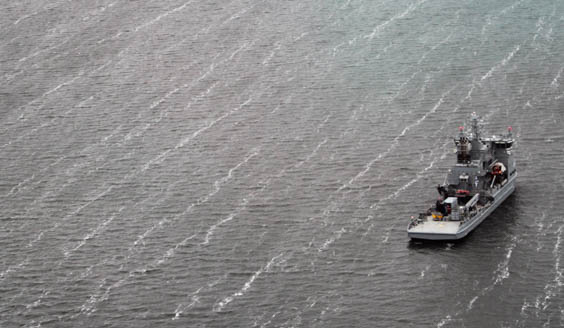Northern Coasts 18
Logistics go where they are needed
Northern Coasts 2018 has gathered together 4 000 soldiers from 13 countries. Among other things the exercise command takes responsibility of the logistics in order to keep the forces battle ready. In this exercise there is a logistic task group supplementing the organic logistics of the task groups. Logistic task group is formed from units of Coastal Fleet and Coastal Brigade. In addition there are some Swedish detachments in the task group organization. Task group command is based on the 8th Service Support Squadron of Coastal Fleet.

- Logistics unites different actors from strategic partners to multinational militaries participating in the exercise. Important actors are Leijona Catering, Millog and military field medical services, according to the task group commander, Commander Iiro Penttilä.
Co-operation between Finland and Sweden has been already tested earlier. Task force command works 24/7 during the exercise. In the first phase of the exercise in Turku all participating vessels were resupplied with fuel, food and water. Each nation has their own agreements with various suppliers that arranged fuel and supply transports. These agreements mean that vessels from participating nations can be observed on supply visits in the ports of Rauman, Pori or Uusikaupunki.
This does not exclude the supply missions to the sea. Each task group at sea has it’s own supply vessels. The logistics task group has established two Forward Logistcs Sites and has under it oil recovery vessel Halli and a number of ground vehicles and supply boats.
- Halli can be used for resupply missions like transporting potable water, evacuating waste, transporting fuel, personnel or materiel, describes Penttilä.
At sea supply can be delivered from vessel to vessel
Logistics is provided where needed according to demand - directly to the vessel at sea. This is called Replenishment at Sea (or RAS as the military acronym goes). RAS enables supply without removing the vessel from the exercise for example for fuel resupply. Fuel can be delivered directly from vessel to vessel. In these cases the according to the agreements the cost is charged from the user instead of costs being carried by the host nation.
- In principle all nations are responsible for their own spares. Vessels carry supply containers for this purpose. The agreement between Finland and Sweden means that each nation treats their respective vessels as their own in the exercises. The only thing not supplied to foreign vessels during the exercise are weapons and ammunition, continues Penttilä.
Logistics requires coordination due to the large geographic area with troops positioned at sea and on land. This means that logistic requests must be submitted 24 hours prior to the expected need so that various transports can be coordinated and resources used effectively. Working communications are a must for a functioning on time delivery of logistics.
Logistics needs training, too
Previous exercises have increased the capabilities of the Finnish logistics know-how. International practices have become familiar and have been adopted also for national exercises.
According to commander Penttilä, the main difference in NOCO18 compared to national exercises is the use of English language. Logistics has to respond to the needs of a larger variety of vessels and units. This provides good experiences in developing national skills and capabilities for the homeland defence, describes Penttilä about the importance of multinational exercises.
What is a successful exercise from the logistics point of view?
- In a successful exercise the logistics has been able to fulfill the planned logistic demand, taken care of possible emergency evacuations and the logistic troops leave the exercise fighting fit. Logistic failure is noticed immediately in the exercise, concludes commander Penttilä.



